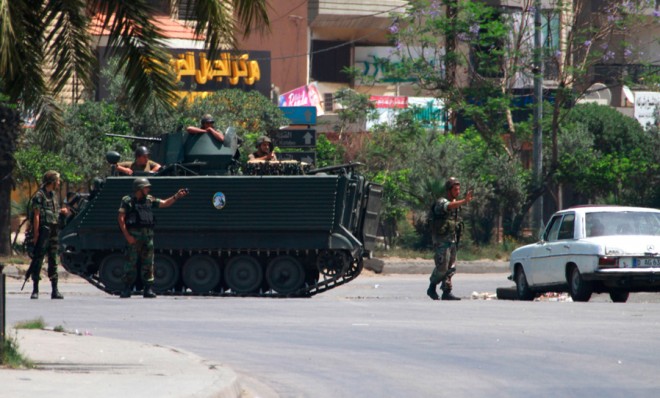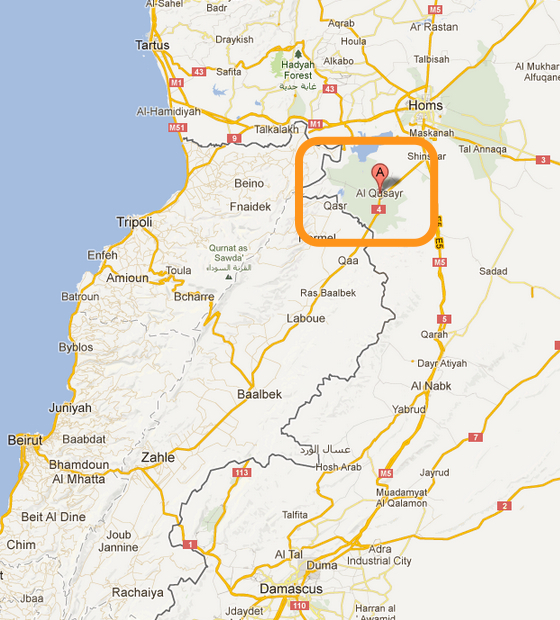Will Hezbollah tip Syria's civil war to Assad?
The Lebanon-based Shiite militant group is getting very involved in the battle for a strategically valuable city in Homs province


A free daily email with the biggest news stories of the day – and the best features from TheWeek.com
You are now subscribed
Your newsletter sign-up was successful
The Syrian army is pummeling the rebel-held town of Qusair, about six miles from the border with Lebanon — and they have help. While the forces loyal to Syrian President Bashar al-Assad bombard the town with airstrikes and artillery from the north and east, the Lebanon-based militant group Hezbollah is launching mortars and rockets from the southwest, rebels say, and Hezbollah militants are fighting their way into the city alongside Syrian government troops. (See a map below.)
Everyone agrees that Qusair, in central Homs province, is an important city to hold. "The region's strategic value is twofold," says The Associated Press' Jamal Halaby:
It links Damascus with the Mediterranean coastal enclave that is the heartland of President Bashar Assad's Alawite sect, an offshoot of Shiite Islam; and rebels smuggle weapons and supplies from Lebanon across the porous frontier to opposition fighters in Syria. [AP]
Furthermore, Assad "believes that reasserting his hold in Homs Province is crucial to maintaining control of a string of population centers in western Syria, and eventually to military campaigns to retake rebel-held territory in the north and east," say Anne Barnard and Hwaida Saad in The New York Times. Plenty of neutral analysts don't think that's likely, but believe the latest assault could lead to the capture of the rebel-held city of Homs and cement Assad's control of the west, effectively splitting Syria in two.
The Week
Escape your echo chamber. Get the facts behind the news, plus analysis from multiple perspectives.

Sign up for The Week's Free Newsletters
From our morning news briefing to a weekly Good News Newsletter, get the best of The Week delivered directly to your inbox.
From our morning news briefing to a weekly Good News Newsletter, get the best of The Week delivered directly to your inbox.
The battle for the city, in heavily contested Homs Province, is viewed by both loyalists and government opponents as a turning point that could, in the words of one activist in Qusair, "decide the fate of the regime and the revolution.... If Qusair is finished, it will be the end of the revolution in Homs." [New York Times]
The situation on the ground is somewhat murky, though both sides say the Assad-Hezbollah combo made serious headway into Qusair on Sunday. Syrian state media claims that government forces have taken most of the city. Al Jazeera's Rula Amin says that appears to be true. "It seems the government is able to control most of Qusair," Amir says from Beirut. "It has been a rebel stronghold for about one year."
Some opposition sources in Qusair tell Reuters that they have repelled the government forces, killing about 30 Hezbollah fighters and 20 government troops. The combined Assad-Hezbollah forces "made incursions into Qusair but they are now basically back to where they started," local activist Tareq Murei said early Monday. A pro-opposition group says that at least 48 rebels and four civilians have been killed since early Sunday.
Hezbollah's critical role in the battle highlights its growing involvement in Syria, and the contagion of the civil war to neighboring countries. Of course, not everyone in Lebanon, or even Hezbollah, thinks it is a good idea for the group — Lebanon's strongest political party as well as a U.S.-designated terrorist organization — to involve itself fighting fellow Arab Muslims. Still, Hezbollah leader Hassan Nasrallah has recently more explicitly involved his group in Syria's war, saying he can't let Syria fall to rebels he views as tools of the West and Israel.
In reality, say Reuters' Khaled Yacoub Oweis and Dominic Evans, the "deepening intervention in Syria by the guerrilla group set up by Iran in the 1980s to fight Israeli occupation troops in south Lebanon" makes this "a proxy war between Shi'ite Iran and U.S.-aligned Gulf Arab states such as Saudi Arabia and Qatar, which back Assad's mostly Sunni foes." The U.S. and its allies are mostly pushing for peace talks with Assad-aligned Russia, and Israel isn't so much taking sides as launching quick strikes against Syrian arms apparently bound for Hezbollah.
A free daily email with the biggest news stories of the day – and the best features from TheWeek.com
With the growing Hezbollah casualties, the shift away from focusing on Israel, and risks of a broader Middle East conflict, some Lebanese Shiites are warning Hezbollah to get out of Syria. "Our jihad is in Lebanon and that is to build our country amid national unity," Ali Al-Amin, the Shiite former mufti of the city of Tyre and Mount Amil in southern Lebanon, told Al Arabiya. In Sunni areas of Lebanon, people strongly back the Syrian rebels.
Now that Hezbollah's in, however, the chances of pulling out seem pretty slim. After the rebels reasserted control over some parts of Qusair on Monday, the loosely organized rebel Free Syrian Army taunted Hezbollah. Congratulations to the "brave heroes" who "have defended their land and their honor from the impurity of the criminal terrorist members of Hezbollah," the rebel group said. "We know very well how their gang is constructed and we know how to take it apart and we will take it apart. We see heads that are ripe for the picking."

Peter has worked as a news and culture writer and editor at The Week since the site's launch in 2008. He covers politics, world affairs, religion and cultural currents. His journalism career began as a copy editor at a financial newswire and has included editorial positions at The New York Times Magazine, Facts on File, and Oregon State University.
-
 The environmental cost of GLP-1s
The environmental cost of GLP-1sThe explainer Producing the drugs is a dirty process
-
 Nuuk becomes ground zero for Greenland’s diplomatic straits
Nuuk becomes ground zero for Greenland’s diplomatic straitsIN THE SPOTLIGHT A flurry of new consular activity in Nuuk shows how important Greenland has become to Europeans’ anxiety about American imperialism
-
 ‘This is something that happens all too often’
‘This is something that happens all too often’Instant Opinion Opinion, comment and editorials of the day
